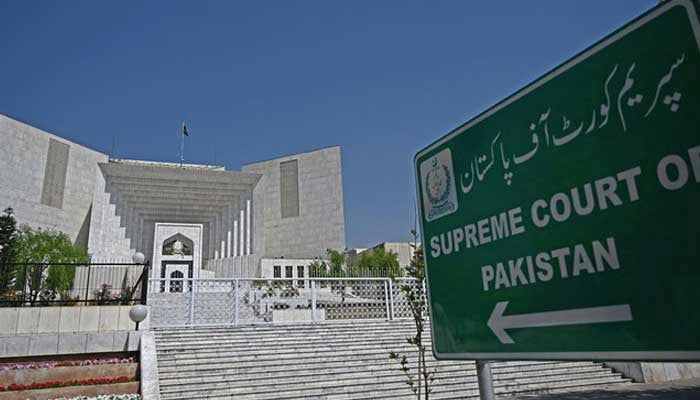PTI files second review plea in SC over party polls case
Second review petition was filed under Article 188 of Constitution through Advocate Hamid Khan
ISLAMABAD: The Pakistan Tehreek-e-Insaf (PTI) on Tuesday filed a second curative review petition against the Supreme Court judgment delivered on October 21, which dismissed its initial review petition in the intra-party election case.
The second review petition was filed under Article 188 of the Constitution through Advocate Hamid Khan, naming the Election Commission of Pakistan, its secretary, and others as respondents.
On October 21, a three-member bench of the Supreme Court, headed by former Chief Justice Qazi Faez Isa, had dismissed PTI’s review petition after its counsel, Hamid Khan, refused to argue until a larger bench of at least five judges was constituted to hear the matter concerning the Supreme Court’s verdict of January 13 regarding PTI’s intra-party elections.
On January 13, the bench, after accepting the appeal of the Election Commission of Pakistan (ECP), had set aside the Peshawar High Court’s (PHC) order that overturned the ECP’s decision to revoke PTI’s electoral symbol, the cricket bat, and reject its intra-party elections.
Hamid Khan, PTI counsel, had submitted before the court that an application was filed in the review petition, requesting the constitution of a larger bench of at least five judges.
However, the court had rejected the PTI’s plea, stating that a larger bench could not be constituted to hear the review petition. The court had asked Hamid Khan to argue and point out any illegality in the main judgment.
Hamid Khan had contended that he did not wish to argue before a bench he perceived as biased against the party.
On Tuesday, the PTI, in filing its second review petition in the Supreme Court, relied upon an order passed by the apex court on August 22, 2024, in the Federation of Pakistan vs. Mubarak Ahmed Sani case.
The PTI requested that the Supreme Court declare its judgments dated January 13, 2024, and October 21, 2024, in Civil Petition No.42 of 2024, titled “Election Commission of Pakistan through Special Secretary, Islamabad vs. Pakistan Tehreek-e-Insaf through its authorised person and others,” and Civil Review Petition No.14 of 2024, titled “Pakistan Tehreek-e-Insaf through its authorised person and others vs. Election Commission of Pakistan through Special Secretary, Islamabad,” as per incuriam, passed without jurisdiction, and coram non judice.
The PTI further requested the court to set aside the judgments dated October 1, 2024, and October 21, 2024, in the aforementioned cases, arguing they were per incuriam, passed without jurisdiction, and coram non judice.
The petition also asked the court to declare that Civil Petition No. 42 of 2024, titled “Election Commission of Pakistan through Special Secretary, Islamabad vs. Pakistan Tehreek-e-Insaf through its authorised person and others,” shall be deemed pending before the court and referred to the committee constituted under Section 2(1) of the Supreme Court (Practice and Procedure) Act, 2023, for necessary orders. Additionally, the PTI requested that the court affirm the binding nature of its larger bench decisions and the decision in Civil Appeal No. 333 of 2024, titled “Sunni Ittehad Council through its Chairman, Faisalabad and another, vs. Election Commission of Pakistan through its Secretary, Islamabad, and others,” on benches of smaller or co-equal strength. The PTI prayed that the impugned order dated October 21, 2024, be set aside and that Review Petition No 14/2024 be fixed for rehearing and decided on its merits in the interest of justice.
-
 Prince William Steps In To Help Farmer's Awareness Mission
Prince William Steps In To Help Farmer's Awareness Mission -
 Queen Elizabeth Tied To Andrew's Sexual Abuse Case Settlement: Report
Queen Elizabeth Tied To Andrew's Sexual Abuse Case Settlement: Report -
 Mark Ruffalo Urges Fans To Boycott Top AI Company Boycott
Mark Ruffalo Urges Fans To Boycott Top AI Company Boycott -
 Prince William Joins Esports Battle In Saudi Arabia
Prince William Joins Esports Battle In Saudi Arabia -
 Princess Beatrice, Eugenie Are Being Ripped Apart: ‘Their Relationship Is Fully Fractured’
Princess Beatrice, Eugenie Are Being Ripped Apart: ‘Their Relationship Is Fully Fractured’ -
 Arden Cho Shares Update On Search For ‘perfect’ Wedding Dress Ahead Of Italy Ceremony
Arden Cho Shares Update On Search For ‘perfect’ Wedding Dress Ahead Of Italy Ceremony -
 Ariana Madix Goes Unfiltered About Dating Life
Ariana Madix Goes Unfiltered About Dating Life -
 Prince William Closes Saudi Arabia Visit With Rare Desert Shot
Prince William Closes Saudi Arabia Visit With Rare Desert Shot -
 Priyanka Chopra Breaks Silence On Rumors Questioning Marriage To Nick Jonas
Priyanka Chopra Breaks Silence On Rumors Questioning Marriage To Nick Jonas -
 'King Charles Acts Fast Or Face Existential Crisis' Over Andrew Scandal
'King Charles Acts Fast Or Face Existential Crisis' Over Andrew Scandal -
 Brooklyn Beckham Charging Nearly £300 In Ticket Cost For Burger Festival
Brooklyn Beckham Charging Nearly £300 In Ticket Cost For Burger Festival -
 Prince William Makes Unexpected Stop At Local Market In Saudi Arabia
Prince William Makes Unexpected Stop At Local Market In Saudi Arabia -
 Zayn Malik Shares Important Update About His Love Life
Zayn Malik Shares Important Update About His Love Life -
 James Van Der Beek's Celebrity Pals Pen Touching Tribute After His Death
James Van Der Beek's Celebrity Pals Pen Touching Tribute After His Death -
 Kate Middleton, William Are Holding Onto Their Hats As Worse Gets Threatened: Behind The Veil Of Shame
Kate Middleton, William Are Holding Onto Their Hats As Worse Gets Threatened: Behind The Veil Of Shame -
 British Soap Awards Scrapped Again As ITV Confirms 2026 Hiatus
British Soap Awards Scrapped Again As ITV Confirms 2026 Hiatus




